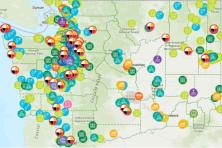With the seasons of both political debates and global warming impacts upon us, you might be hearing more than usual about our climate challenges, and probably at least some ideas and proposals out there for solutions and progress.
That’s good. But it’s probably more rare for a lot of us to have climate conversations over the kitchen table, bringing the issue home into our everyday lives.
Why should we talk about climate with more people? The Yale Center for Climate Communications found through its research that if people draw a personal connection to being impacted by global warming, they’re far more likely to take action to solve it — double digits more likely. And through a poll we conducted with Washington State last November, we found that folks who talk about climate are far more likely to support solutions.
Download our conversation card with tips for starting your own climate conversations.
If we talk about how climate change affects our lives, it becomes a close-to-home problem rather one happening farther away or in the future. Yet if you look at Yale's most recent data, we see most folks think the U.S. and the Pacific NW will be impacted, but don’t think global warming will impact them personally.


We know talking about climate can seem hard. Here are some tips on how to make those conversations flow:
1. Take the temp. with the weather. Weather is not climate—but it’s an easy topic to see where folks are at on the issue.
2. Acknowledge anxiety. We often avoid the topic because it’s scary and we feel powerless or don’t want to bring up what could feel like a depressing issue. Name that fear and the problem we face, and the other person will likely feel less anxious.
3. Connect personally. People are motivated to solve a problem if they feel personally affected by it. Connect with someone about local impacts we’re seeing, but don’t get stuck there! Solutions are the most important part of your story.
4. Talk about solutions, solutions, solutions. Wind and solar energy are highly popular, but people don’t necessarily see solutions happening. So talk up what you’re excited about, especially great things happening in our communities.
5. Try and try again. The fossil fuel industry is invested in our cynicism—let’s invest in hope and determination instead. Some won’t want to talk about climate... but you’ll find that many others do. There’s nothing inevitable about the climate crisis—we can turn this around. Make your hope infectious!
Like these tips? Bookmark this link on your phone or laptop to create an easy resource in your browser -- a low-tech app for that.
Even as this problem continues to seems like such a wicked one to confront, we can show and learn together how having climate conversations can be easier - and necessary - and collective action can be too.





